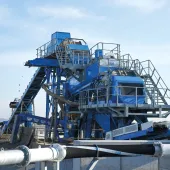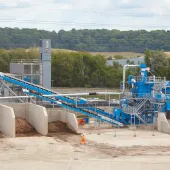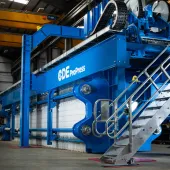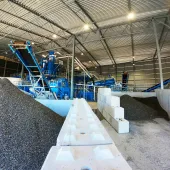CDE Global's approach to planned maintenance

First published in the October 2013 issue of Quarry Management as Prevention Better than Cure
How effective is planned maintenance as a way of saving money? Martin Jackson, global custom care manager with CDE Global, assesses the often overlooked and underestimated benefits of preventative maintenance.
In many large-scale, plant-based industries, poorly managed maintenance schedules can account for as much as 40% of the operational budget. In the medium- and long-term, the cost implications of ignoring planned maintenance can be, and frequently are, substantial. Therefore, improving maintenance effectiveness is a potential source of significant cost savings.
However, for many businesses operating in a variety of industries, planned and preventative maintenance is often low on the list of priorities, largely because of its intangible nature. In the short term, as other issues take priority, preventative maintenance is often sidelined or even ignored without any immediate or obvious concerns. This is a mistake that too many businesses make and can often be directly related to a decline in plant performance over the longer term.
Why preventative maintenance and what does it involve?
The key is in the word ‘prevention’. Making sure no barriers exist that would make the processing of material difficult is vitally important for quarry owners and site operatives alike. As the saying goes ‘time is money’, and this is most definitely the case in the competitive market for washed aggregates.
Carrying out regular maintenance inspections on key items of plant will ultimately reduce downtime, increase operational efficiency and ensure that the risk of expensive reactive work is reduced substantially through planned and routine checks.
In addition, preventative maintenance measures can drastically reduce faults in day-to-day operations, and increase the overall readiness of plants in case unexpected levels of processing are required. Not only does regular maintenance improve and extend the life of the plant by preventing excess impairment, maintenance also includes, but is not limited to, adjustments, cleaning, lubrication, repairs and the replacement of parts. Moreover, having the ability to prevent possible issues from arising in the future and causing downtime also helps to avoid any interference with the ability to deliver quality customer service.
In CDE’s experience, the cost of maintenance can be three times higher if no form of preventative maintenance programme is in place. If no problems are experienced with a plant at the outset, it is very easy to dismiss the value of this type of service – until a problem is encountered at first hand. Regular inspections will pick up a large percentage of common faults that would otherwise not have been known about, and very often these faults can be easily rectified by having a competent service engineer on site.
Unplanned maintenance costs – an unnecessary drain
A recent example of costs incurred through lack of structured maintenance involved a customer who incurred a bill of £4,000 by not adhering to greasing schedules. This not only resulted in the replacement of various parts, but also approximately two days of plant downtime. In this instance, had a preventative maintenance inspection regime existed, the engineers would have been made aware of the issues on one of their regular site visits and plant downtime would have been avoided.
In another instance, a £3,000 cost was incurred after an untrained plant operative manually modified overload settings on the control panel of an AquaCycle plant, causing structural damage to the plant. Ensuring operators are fully trained is critical, as in this instance the problem would have been avoided had appropriate training been provided. With both plant-specific training and preventative maintenance in place, the savings would have been substantial for the customer.
At another site, various maintenance tasks were overlooked by operators, resulting in the need to replace chutes, a bearing on a RotoMax unit and a tail drum on a conveyor, amounting to £3,500 in costs. Again, this example serves to highlight the importance and value of planned maintenance in terms of cost savings, as well as in terms of the downtime experienced in the three scenarios outlined above.
Repair focused vs reliability focused
In order to remain competitive by keeping running costs down and increasing capability, it is necessary to move away from a ‘repair-focused’ attitude and to adopt a ‘reliability-focused’ outlook. Furthermore, by maintaining plant equipment effectively, not only will production be maximized, but depreciation of the plant, in terms of wear and tear throughout its lifetime, will be minimized.
So, will preventative maintenance save money in the long term? The short answer is, yes it will. It will help avoid reductions in the average rate of throughput, it will help avoid increases in operating costs and, more importantly, it will help avoid any impediments to customer service.
Due to the varying needs of different plants, the type and amount of preventative maintenance required will vary greatly but, ultimately, it will help ensure the delivery of maximum levels of production and high-quality end products.
For further information visit: www.cdeglobal.com/custom-care
- Subscribe to Quarry Management, the monthly journal for the mineral products industry, to read articles before they appear on Agg-Net








